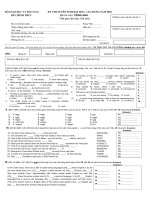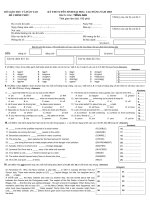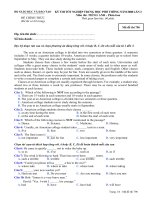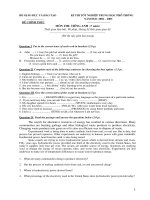Tài liệu tham khảo trực tuyến môn Tiếng Anh lớp 6 | THCS Thanh Xuân Trung
Bạn đang xem bản rút gọn của tài liệu. Xem và tải ngay bản đầy đủ của tài liệu tại đây (420.86 KB, 8 trang )
<span class='text_page_counter'>(1)</span><div class='page_container' data-page=1>
<b>THANH XUAN TRUNG SECONDARY SCHOOL</b>
</div>
<span class='text_page_counter'>(2)</span><div class='page_container' data-page=2>
<b>Unit 6. OUR TET HOLIDAY</b>
<b>A. READING</b>
<b>I.Read the following text and choose the correct answer.</b>
Thanksgiving is celebrated in the USA and Canada. In The USA, it is celebrated on
the fourth Thursday in November every year. The Canadians celebrate it on the
second Monday in October. It is associated with giving thanks to God. In the
beginning people expressed gratitude for the harvest they reaped. It used to be a
religious holiday but now it has become a secular celebration.
The most important part of the celebration is the dinner which includes the
customary turkey served with cranberry sauce, and pumpkin. A lot of business goes
on during this holiday. For example, restaurants take advantage of the holiday to sell
turkey dinners.
</div>
<span class='text_page_counter'>(3)</span><div class='page_container' data-page=3>
1.The origin of the name "Thanksgiving" comes from:
A. thanks given to God
B. thanks given for the help the early settlers got from
each other.
2.Thanksgiving is a time to
...
A. worship God B. thank god, eat and have fun.
3.It is a vacation for ...
A. everybody
B. a lot of people
</div>
<span class='text_page_counter'>(4)</span><div class='page_container' data-page=4>
<b>II.Read the passage and choose the best answer for each question.</b>
It is traditional in England to celebrate the end of the old year and welcome in the new year at the end of
December.
December 31 is New Year's Eve. New Year's Eve is not a public holiday. Most people go to work as usual.
In the evening, many English people have parties in homes. Others celebrate in pubs or clubs with their
friends and families, or attend outdoor gatherings and firework displays.
Just before midnight on New Year's Eve, people hold hands and sing a traditional song called "Auld Lang
Syne". They count the seconds down to the new year and when the clock strikes midnight, they hug and kiss
and wish each other a happy new year! Sometimes people set off firework as the new year begins.
People often drink a toast to the coming year with a fizzy alcoholic drink called champagne. Some people
let their children stay up late to join in with the celebrations.
New Year's Day is celebrated on January 1. New Year's Day is a bank holiday. A bank holiday is a public
holiday. Most shops and businesses close for the day.
New Year's Day is a holiday for nearly everyone in the UK. Very few buses and train run on New Year’s
Day. Most people stay at home and relax with their families.
There is an old superstition in Scotland and some other parts of the UK that the first person to enter
someone's home on New Year's Day will bring all the luck for the coming year with them. This tradition is
called first footing.
</div>
<span class='text_page_counter'>(5)</span><div class='page_container' data-page=5>
1. When is New Year's Eve?
A. January 1 B. December 30 C. December 31
2. English people always keep their New Year's resolutions.
A. True B. False C. Not given
3. What traditional song do English people sing on New Year's Eve?
A. Old Macdonald B. Auld Lang's Syne C. Old King Cole
4. English people usually stay at home on New Year's Eve, and go to bed early.
A. False B. True C. Not given
5. Some English children are allowed to stay up late on New Year's Eve.
A. False B. True C. Not given
6. Most buses in England don't run on New Year's Day.
A. True B. False C. Not given
7. A "first footer" is ...?
A. the first person to go outside on New Year's Day
B. the first person to enter a house on New Year's Day
C. the first person on the dancefloor on New Year's Eve
8. What do English people sometimes toast the new year with?
A. bread B. marshmallows C. champage
9. New Year's Eve is a blank holiday in England.
</div>
<span class='text_page_counter'>(6)</span><div class='page_container' data-page=6>
<b>B. WRITING</b>
<b>I.</b>
<b>Put in the verbs in brackets into the gaps and form sentences. </b>
<i><b>Use will.</b></i>
1.
Tomorrow it ... in the north-west. (to rain)
2.
My friend
... 12 next Monday. (to be)
3.
Hey John! Wait a minute. I ... a word with
you. (to have)
4.
She ... her boss next week. (to contact)
5.
I think you ... this job. (to get)
6.
They ... at about 6 p.m. (to arrive)
7.
The teacher ... this exercise. (to explain)
8.
He ... the bottle of water. (to drop)
9.
Lots of accidents ... in that weather. (to
happen)
</div>
<span class='text_page_counter'>(7)</span><div class='page_container' data-page=7>
<b>1. He has a ... </b>
<b>so ... </b>
headache
he should stay in bed
<b>2. She has a ... </b>
<b>so ... </b>
stomachache
she should see a doctor
</div>
<span class='text_page_counter'>(8)</span><div class='page_container' data-page=8>
<i><b>IV.Should or shouldn't?</b></i>
1.
We
have to wait long. The train is due in a
couple of times.
2.
We
drink so much coffee. It's not good for us.
3.
If you're not feeling very well, you
go home.
4.
If the delivery is urgent, you
send it express post.
5.
I think we
get paid commission for our sales.
We'd be more motivated that way!
6.
I don't see my grandparents very often. I
go and see them soon
7.
I
make so many personal calls from the office.
My boss is going to notice.
8.
He
apologise. He was absolutely right.
shouldn’t
shouldn’t
should
should
shouldn’t
should
shouldn’t
</div>
<!--links-->









